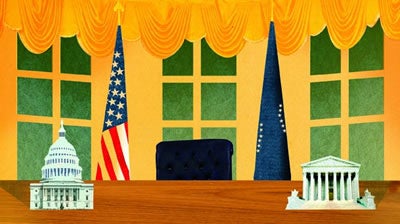Defending strong executive power is nothing new for Professor Adrian Vermeule ’93. It is a theme he and co-author Eric A. Posner ’91 first explored in their 2007 book, “Terror in the Balance.” Now, in their latest collaboration, “The Executive Unbound: After the Madisonian Republic” (published by Oxford University Press this spring), Vermeule and Posner set out to explain why the traditional separations of power confining the executive have weakened over time—and why that’s not necessarily worrisome. Vermeule explains that the book was an opportunity to “distill, elaborate and modify” ideas that he and Posner have been working on together and separately for years. Below, he answers six questions from Seth Stern ’01.
HLB: Are fears of tyranny—what you label “tyrannophobia”—on left and right overblown? Is everyone unnecessarily anxious about executive power?
Adrian Vermeule: Many people are. A striking feature of American political and legal discourse is that both left and right are anxious about executive power and the policies that the imperial executive pursues, but on different issues: The left is typically anxious about counterterror policy and (putative) civil liberties; the right is anxious about the regulatory state and infringements of (putative) property rights. Paradoxically, on any given issue there is often a sufficient political coalition to sustain broad executive power, even though many believe in some abstract sense that executive power is too sweeping.
 You describe “tyrannophobia” as a central element of American political culture since the nation’s founding. Are the recent comparisons of both former President Bush and President Obama to Hitler consistent with that aspect of our political culture?
You describe “tyrannophobia” as a central element of American political culture since the nation’s founding. Are the recent comparisons of both former President Bush and President Obama to Hitler consistent with that aspect of our political culture?
Certainly. But these are just extreme examples of familiar tropes; comparisons between American presidents and foreign monarchs or dictators are as old as the hills.
Why has the center of gravity in American political life shifted to the executive at the expense of Congress and courts?
The book answers this at length. In brief, the increasing rate of change in the policy environment, combined with individual and institutional incentives on the part of legislators and judges, has resulted in delegations of ever-increasing scope, ever-increasing deference to presidential emergency measures, more unilateral regulatory action by the executive and more presidential control of the congressional agenda.
Do courts get more credit than they deserve for acting as an effective check, particularly in the context of the post-9/11 war on terror?
One of the main props of expansive executive power is that the executive is the least dysfunctional branch. Courts do get more credit than they deserve. When a case like Boumediene [granting habeas rights to Guantá namo detainees] hits the headlines, people fail to realize that there is a large gap between judicial rhetoric and the reality of judicial action on the ground. As we detail, after Boumediene, the courts have actually done surprisingly little to oversee executive detention at GTMO, Bagram and elsewhere.
Is the shift permanent and has it intensified since 9/11 and the 2008 economic crisis? And might the balance reset should the economy improve or the war on terror ease?
There are two different time scales one might examine: the short run and the long run. In the short run, executive power waxes and wanes with the ebb and flow of politics and the state of the policy environment, including things like public perceptions of terrorist threats and the performance of the economy. In the long run, however, executive power has tended to expand over time. An analogy is to the stock market, which fluctuates up and down but systematically trends upward when viewed over long time slices.
You argue that political constraints matter more than legal ones. How does public opinion act as an effective constraint on the modern president?
A paradox of the presidency: Despite their sweeping legal powers, all modern presidents and their advisers are slaves to opinion polls and other measures of ambient public opinion. Partly this is an effort to anticipate the next round of elections, but it is also an attempt to burnish the president’s legacy and more generally to lead from the front. For the most part, presidents can take the crowd only where it is willing to go.

